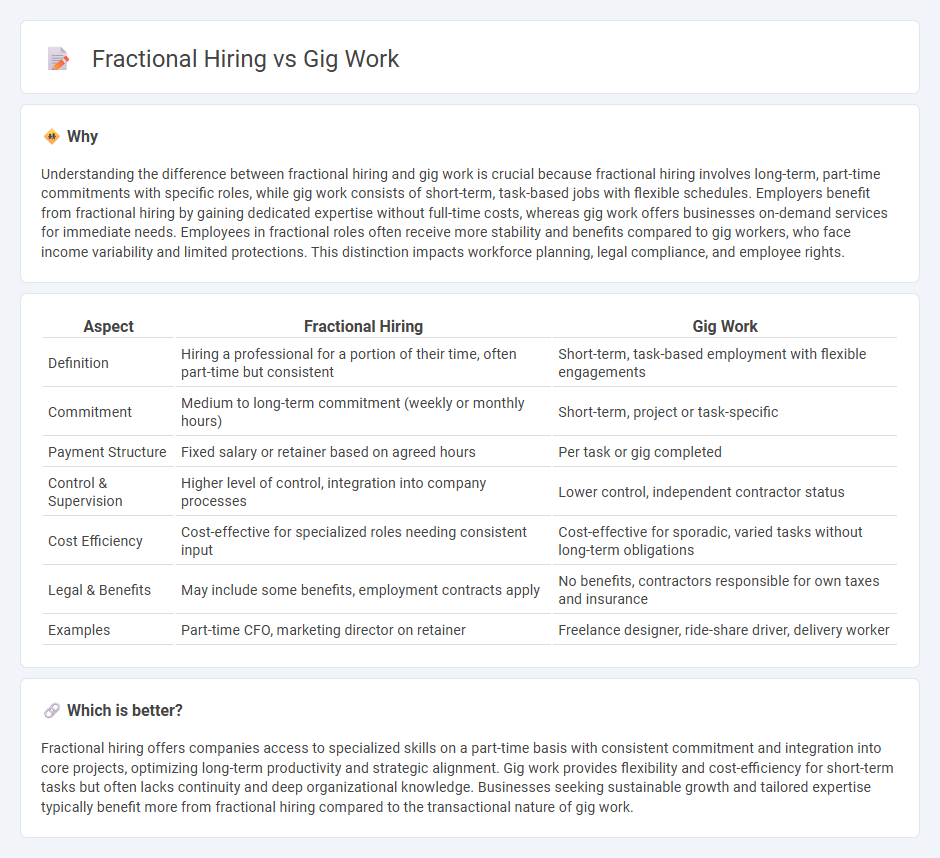
Fractional hiring involves engaging skilled professionals for part-time, strategic roles within an organization, offering expertise without full-time commitment, while gig work focuses on short-term, task-based assignments often facilitated through digital platforms. Fractional roles provide continuity and deeper organizational integration, contrasting with the flexible, on-demand nature of gig jobs. Explore how these distinct employment models can optimize workforce strategies for your business.
Why it is important
Understanding the difference between fractional hiring and gig work is crucial because fractional hiring involves long-term, part-time commitments with specific roles, while gig work consists of short-term, task-based jobs with flexible schedules. Employers benefit from fractional hiring by gaining dedicated expertise without full-time costs, whereas gig work offers businesses on-demand services for immediate needs. Employees in fractional roles often receive more stability and benefits compared to gig workers, who face income variability and limited protections. This distinction impacts workforce planning, legal compliance, and employee rights.
Comparison Table
| Aspect | Fractional Hiring | Gig Work |
|---|---|---|
| Definition | Hiring a professional for a portion of their time, often part-time but consistent | Short-term, task-based employment with flexible engagements |
| Commitment | Medium to long-term commitment (weekly or monthly hours) | Short-term, project or task-specific |
| Payment Structure | Fixed salary or retainer based on agreed hours | Per task or gig completed |
| Control & Supervision | Higher level of control, integration into company processes | Lower control, independent contractor status |
| Cost Efficiency | Cost-effective for specialized roles needing consistent input | Cost-effective for sporadic, varied tasks without long-term obligations |
| Legal & Benefits | May include some benefits, employment contracts apply | No benefits, contractors responsible for own taxes and insurance |
| Examples | Part-time CFO, marketing director on retainer | Freelance designer, ride-share driver, delivery worker |
Which is better?
Fractional hiring offers companies access to specialized skills on a part-time basis with consistent commitment and integration into core projects, optimizing long-term productivity and strategic alignment. Gig work provides flexibility and cost-efficiency for short-term tasks but often lacks continuity and deep organizational knowledge. Businesses seeking sustainable growth and tailored expertise typically benefit more from fractional hiring compared to the transactional nature of gig work.
Connection
Fractional hiring and gig work both emphasize flexible employment models that cater to project-based or time-limited engagements, optimizing workforce utilization for businesses. They enable companies to access specialized talent without committing to full-time contracts, reducing overhead costs and increasing operational agility. Gig work platforms facilitate fractional hiring by providing a marketplace for freelancers and contractors to connect with employers seeking short-term or specific skill sets.
Key Terms
Flexibility
Gig work offers unparalleled flexibility by allowing individuals to choose projects and work hours based on personal availability, making it ideal for short-term, task-specific roles. Fractional hiring provides organizations with flexible access to specialized expertise for a portion of the time, enabling strategic contributions without full-time commitments. Explore how these models can optimize workforce agility and meet evolving business needs.
Project-based
Project-based gig work involves hiring freelancers or contractors for specific tasks with flexible timelines and deliverables, offering quick scalability and cost efficiency. Fractional hiring secures part-time access to specialized professionals who contribute ongoing expertise within defined hours, ideal for complex projects requiring consistent leadership. Explore the advantages of both models to optimize your project management strategy and budget allocation.
Talent specialization
Gig work often involves short-term tasks performed by generalists, whereas fractional hiring emphasizes specialized expertise contributed by professionals on a part-time basis. Fractional talent provides businesses with access to high-level skills and strategic insights without committing to full-time employment, enhancing project outcomes. Explore how fractional hiring can elevate your talent strategy beyond gig work.
Source and External Links
35 Gigs Jobs To Explore (With Benefits and Tips) - Gig work offers flexible, contract-based jobs across various industries including transportation, delivery, and personal services such as dog walking, babysitting, telehealth, and tutoring, often requiring background checks and specific skills.
Find Quick Jobs Near You | Get Hired for Local Work with ... - GigSmart app connects workers quickly to local, flexible, hourly shift gigs and project gigs allowing workers to accept offers instantly and control when and where they work.
What is a gig worker? - Gig workers perform income-generating activities outside traditional, long-term, direct employment, with the gig economy encompassing diverse definitions and sizes depending on perspective.
 dowidth.com
dowidth.com